Tooth Extractions – Prosper, TX
Get Your Problem Tooth Pulled

As you might know, it’s best to save your teeth whenever possible. That much is natural – regular pearly whites are superior for chewing, speaking, and smiling. However, sometimes a tooth is too damaged or decayed to be saved. A dentist must extract it in those cases, painlessly removing it from your mouth. Fortunately, we at Texas Dental Surgery are very well-versed in tooth extractions. If you or a loved one needs this service, just keep reading or call our office today.
Reasons Why Tooth Extractions are Necessary

Remember: a tooth extraction isn’t an ordinary dental procedure. Given the importance of natural teeth, dentists only perform one as a last resort. Instead, they typically suggest restorative procedures like root canal therapy or dental crowns as alternatives.
Unfortunately, there really are occasions when extraction is necessary. Your oral health could suffer by failing to get one. As such, we’ll only recommend this option if you meet one (or more) of the following criteria:
- Severe tooth decay or damage
- An impacted tooth
- A dental infection at risk of spreading
- Dental overcrowding that prevents orthodontic work
- A “baby” tooth that won’t fall out on its own
The Process of Removing a Tooth
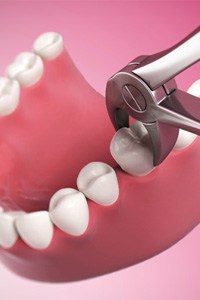
Once we’ve confirmed you need an extraction, our team will decide how to extract your tooth. In particular, we’ll settle on whether to do a simple extraction or a surgical one.
A simple extraction is done when the affected tooth is already visible. After the dentist numbs your mouth, it removes your tooth with a special pair of forceps. They then use this tool to rock the pearly white back and forth until it separates from your gum tissue.
In contrast, a surgical extraction occurs when the tooth hasn’t fully erupted. Should that happen, a dentist will first make a gum incision to gain better access. They’ll then divide and remove the tooth in sections to minimize bone loss. Lastly, the procedure concludes by sewing up the incision site.
Whichever extraction takes place, a dentist will follow it with tooth replacement options. These ensure you can avoid the long-term harm of tooth loss.
Tooth Extraction Aftercare

Following extraction, the treatment site will be sensitive and need time to heal. As such, we’ll provide you with post-op instructions that aid in your recovery. Tips it may cover include:
- Take over-the-counter pain relievers to manage post-extraction aches
- Within a day after the extraction, do a salt water rinse to clean the extraction site
- To avoid a dry socket, don’t drink from a straw during the week after treatment
- Quit smoking to speed up the healing process
- Get plenty of rest so your mouth heals properly
With the suggestions above, you’ll heal from extraction quickly. You can then consider replacing the missing tooth (or teeth). Choosing to do so would keep surrounding teeth from tilting, restore more of your bite force, and more.
Understanding the Cost of Tooth Extractions
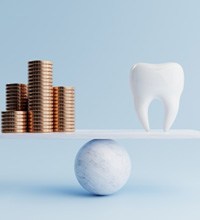
However much it’s needed, you may worry a tooth extraction is too expensive. Fair enough – you can only get a treatment within your budget. Truthfully, though, the cost of tooth extractions varies from patient to patient. You’ll need to consult our doctors for an exact procedure estimate. From there, Texas Dental Surgery will strive to make it affordable. We’ll even guide you through extraction pricing factors and payment options. Please keep reading to learn more, or contact us for details.
Factors That Can Affect Tooth Extraction Cost
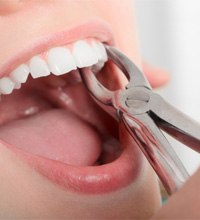
At the initial consultation, our office will examine your tooth to confirm the extraction’s cost. (It isn’t easy to estimate the expense otherwise.) This process will look at several factors that impact the overall price. These include:
- Tooth Location, Type, and Number: As it happens, different teeth cost different amounts to pull. (Molars are more expensive to extract than canines, etc.) At the same time, it costs more to remove multiple teeth than just one.
- Overall Treatment Complexity: If a tooth is impacted or erupted, pulling it will be tricky. As such, the procedure price will rise.
- Need for Follow-Up Services: In many cases, a patient will need tooth replacement work after an extraction. (These range from dental implants and bridges to dentures.) If that applies to you, your overall treatment cost will increase.
Does Dental Insurance Cover Tooth Extractions?
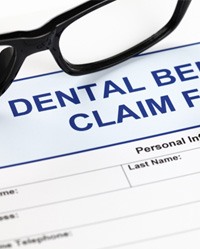
Even without insurance, there are other ways to make tooth extractions affordable. The best of these are unique payment options from your dental practice. Given the right one, an otherwise expensive extraction can easily fit your budget.
Look at Texas Dental Surgery, for instance. Our office offers dental financing through CareCredit and Lending Club. Through either third-party financier, you can pay for treatment with low-interest monthly installments. You could then cover the cost of an extraction gradually.
As you can see, Texas Dental Surgery can provide effective and budget-friendly tooth extractions. So, don’t hesitate to book a consultation at our office. We’ll help you navigate the costs and ensure worthwhile care!
How to Make Tooth Extractions Affordable

Even without insurance, there are other ways to make tooth extractions affordable. The best of these are unique payment options from your dental practice. Given the right one, an otherwise expensive extraction can easily fit your budget.
Look at Texas Dental Surgery, for instance. Our office offers dental financing through CareCredit and Lending Club. Through either third-party financier, you can pay for treatment with low-interest monthly installments. You could then cover the cost of an extraction gradually.
As you can see, Texas Dental Surgery can provide effective and budget-friendly tooth extractions. So, don’t hesitate to book a consultation at our office. We’ll help you navigate the costs and ensure worthwhile care!
Tooth Extractions FAQs
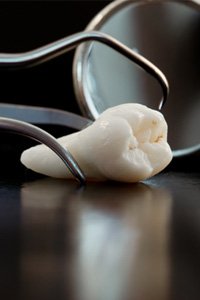
Even more so than other dental treatments, people are often nervous before a tooth extraction because they’re concerned about the prospect of pain. Thankfully, having a tooth extracted is a completely painless process—your entire mouth will be numbed completely before beginning the procedure, ensuring your comfort.
You may be a little bit sore for a few days after your tooth has come out, so be sure to follow our aftercare instructions closely to ensure your comfort.
Does Getting a Tooth Extracted Hurt?
Even more so than other dental treatments, people are often nervous before a tooth extraction because they’re concerned about the prospect of pain. Thankfully, having a tooth extracted is a completely painless process—your entire mouth will be numbed completely before beginning the procedure, ensuring your comfort.
You may be a little bit sore for a few days after your tooth has come out, so be sure to follow our aftercare instructions closely to ensure your comfort.
What’s the Recovery for Tooth Extractions Like?
As you might have figured, the recovery process looks different from patient to patient. That said, most people start to feel better after around 3 days. One of the most important aspects of healing effectively is the preservation of the clot forming in the extraction area. Take care not to spit excessively, use a straw, smoke, or do anything else that could pull the clot out of place.
You should also endeavor to keep your mouth clean and prevent infection, which means brushing and rinsing with saltwater. Keep these things in mind and you should be feeling better in no time at all.
What Are My Options for Replacing a Missing Tooth?
Once your tooth has been removed, you have a decision to make: how you’re going to replace the tooth that you’ve lost. There are several ways to do that, and each of them could serve you well in different scenarios.
Dental bridges are an excellent way to replace one or two teeth that are right next to each other, using the stability of the natural teeth for support. Dentures are better for replacing more teeth, or all of the teeth on a gum ridge.
Then there are dental implants, which have an incredible amount of stability and durability. While they’re pricier up front, you’re likely to save money in the long run on replacements. When we meet you, we’ll be able to tell you more about what kind of treatment could be best for you.
How Should I Prepare for My Tooth Extraction?
Before you see us for your tooth extraction, we’ll give you thorough instructions on what you can do to make sure that you’re prepared for your treatment.
This typically involves wearing loose clothes, wearing glasses instead of contacts, and if you’re undergoing anesthesia, fasting before the procedure. Be sure to come to your consultation with any questions that you have, and we’ll make sure that you’re prepared.

